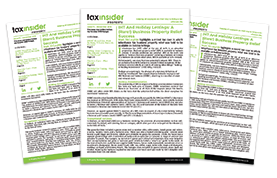Before you go, sign up to our free tax saving email course. Get 7 top property tax saving strategies in your email inbox that will help you save thousands in tax. Unsubscribe any time.
|
The valuation of assets for tax purposes is a tricky business. It has been called a ‘dark art’; a specialist area for experts, not to be dabbled in by other professional advisers. Get help!Even HM Revenue and Customs (HMRC) officers don’t normally engage in tax valuations of assets; they enlist the help of specialists in other government departments, i.e. Shares and Assets Valuation (unquoted shares) and Valuation Office Agency (VOA) (land and buildings). This article focuses on inheritance tax (IHT) valuations of the latter. Even if a qualified specialist valuer is used, that does not necessarily mean the property valuation will go unchallenged by HMRC. There are several areas of possible disagreement between a taxpayer’s professional valuer and the VOA where a property valuation is advanced on the taxpayer’s behalf. Development valueOne area of possible dispute concerns development value. HMRC’s view is that the potential for development value must be considered and taken into account in the valuation where an estate contains land and buildings (see HMRC’s Inheritance Tax manual at IHTM36275). HMRC’s guidance adds: “Hope value is a component part of the open market value in appropriate cases, whether or not planning permission has been sought or granted”. But how much of the development or hope value should be taken into account? The subjective nature of this issue means that valuations by a taxpayer’s specialist valuer and the VOA may vary considerably, and the tribunal may not agree with either valuation. Differences of opinionFor example, in Foster v Revenue and Customs [2019] UKUT 251 (LC), a deceased individual’s estate included 6.39 acres of an unregistered freehold agricultural (pasture) site. A dispute arose between the deceased’s executor and HMRC about the open market value of the site for IHT purposes. The executor (on professional advice) valued it at £191,700; HMRC (on the VOA’s advice) valued it at £850,000. The Upper Tribunal (Lands Chamber) (UT) considered that at the valuation date a hypothetical purchaser would have considered there to be a reasonable prospect of obtaining planning permission for the residential development of the site. However, there were several problems to overcome (e.g. no possibility of vehicle access to the site without relying on a third-party), which would be reflected in the price that the hypothetical purchaser would be prepared to pay for the site. Furthermore, the valuation experts for the executor and HMRC took fundamentally different approaches to calculating the open market value of the site. The UT favoured HMRC’s ‘top down’ approach (i.e. assessing the value of the site assuming it had residential planning permission at the valuation date and making deductions for access risk and planning risk and deferment) and applying a total risk adjustment factor of 80%. The tribunal determined the open market value of the site at the valuation date to be £590,000. Practical tipOther case law (e.g. Prosser v IRC DET/1/2000 [2001] RVR 170 and Palliser v Revenue and Customs [2018] UKUT 71 (LC)) indicates that development value should be discounted, based on a 50% chance that planning permission will be obtained where no planning application has been made. Land and property valuations are complex and should only be undertaken by a professional valuer. This is a sample article from the monthly Property Tax Insider magazine. Go here to get your first free issue of Property Tax Insider. |


 Tax Articles
Tax Articles
 Mark McLaughlin points out that challenging HMRC valuations of land can yield positive results.
Mark McLaughlin points out that challenging HMRC valuations of land can yield positive results.